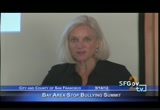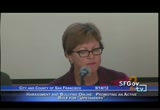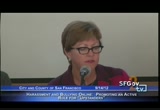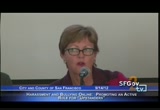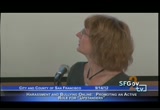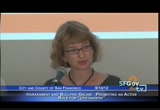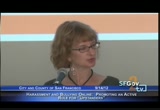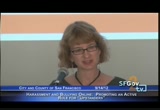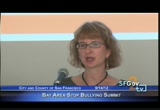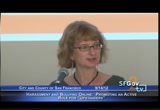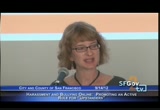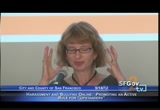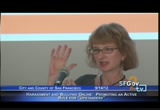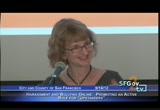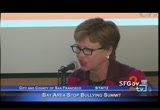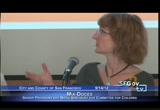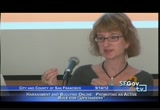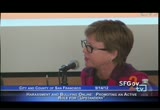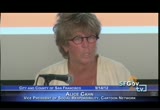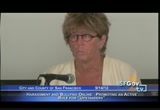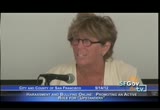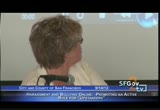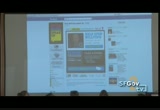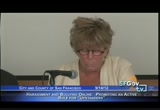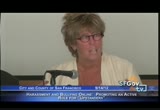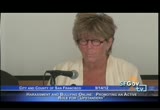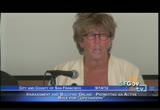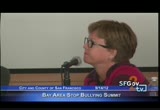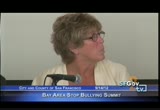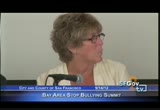tv [untitled] November 8, 2012 10:00pm-10:30pm PST
10:00 pm
everybody needs to go but again it's an important top and i can flowed through many of the conversations today and harassment and bullying online and i will introduce the moderator and she is anne collier and executive director of family news and a journal iftd and youth advocate and the coauthor of a parent's guide to facebook and myspace unraveled and social networking. she served on president obama technology working group and delivered its group to congress and youth safety on the internet and you can read her plug. how's that for a plug? >> thank you very much. our parents guide is free and can be distributed at schools or parent nights or whatever, so we're happy to make them available to you at connect safety .org so a
10:01 pm
little bit more of the big picture. this is amazing panel of people who have resources and campaigns that can support and reinforce your fine work. so i am glad you stayedand we learned about bullying and preventions and solutions and just to reinforce getting the accurate picture bullying is a serious problem but it's not an epidemic. it's not on the rise. daift finkelhorn and director of the research center university of new hampshire and reviewed studies and bullying among youth is actually down in recent years. his colleague have
10:02 pm
actually stopped using the term of "bullying" and refer to peer aggression and i can go into definitions but i won't bore you. a subset of bullying is also not on the rise and based on researchers and their samples and other scholar's work and 20% of teens have ever experienced cyber bullying and a scholar from norway published lower numbers but why be such a stickler about accurate data? because the norms for research say getting the facts out takes the tacit acceptance or fatalism out of the picture. perception
10:03 pm
changes behavior so when we connect surveys in school and own their own data and a psychology professor at university of nebraska and the vast majority of students moment engage in bullying behavior and when students find that out bullying behavior goes down further and it's a powerful resource you can use. now i'm going to introduce this amazing panel. first we have just to my right mia from sealtion. she is going to explain more about this term that was used a lot today and social literacy or social emotional learning. alice con is from cartoon network. dave
10:04 pm
steer to her right is from facebook and next to him is officer holly lawrence, sunny valley of public safety, digital safety program and she's going to talk about which is a powerful thing going national. and next -- is brian here? no. okay. all right. so we're all set and mia i would like you to enlighten us more in all that you're doing in social emotional learning. >> sure. i had some slides but i'm not sure -- no, we have a handout that went around to you and more detail about what social emotional learning is because i think we rise a little bit today and i came from seattle and i know many people have brought up that term today and i get the sense from this group that you're at kind of a high level of discourse and you
10:05 pm
have a general understanding. could i see a show of hands for those of you that social emotional learning is a familiar term? and those that feel you have a deep understanding of it? okay. great. thank you. i want to introduce myself a little more so you have the context of what i do. i work for a nonprofit in seattle "committee for children" and we have been around for about 32 years. we're nonprofit and we do both education and advocacy and on the education end we develop be curriculum and the curriculum is used widely across the country. it's in every state in the country and in canada and 70 countries around the world and programs we're familiar with is second step and i am hearing some nods and we
10:06 pm
have a -- idea of kind of what kind of things that we do, and i also do advocacy work so i come and speak at meetings like this. i was at the attorney general's meeting in washington state and i would like to congratulate you and especially those in law enforcement in california for the high level of discourse that you have incredibly impressed today by what i have heard and my hats off to you for all the
10:07 pm
good work you're doing. so i do advocacy and part of that is kind of reaching out to people and bringing the message of social emotional learning not just to schools because educators kind of get it. it's not a stretch when we talk to them why it's important to get it, but we want to take the message outside of the school into the media, into the communities, into families so that people kind of understand this process of another way of learning and becoming an educated person. a couple of other things i do i work with anne on the board and with the foundation. that has been exciting. i do advising for sesame street. if you have small children the next seafn sesame street you will see some of the favorite characters and breathing and learning problem
10:08 pm
solving models and we're very excited -- >> [inaudible] >> and they're focusing on self regulation and other skills and specific focus and exciting working with them the past year and a half or so so i want people to have a look here, and what i would like to do is tie some of the things together that you have been hearing about today and in terms of bullying prevention, other prevention work going on in your state and in terms of promoting positive behaviors with youth, and so sometimes you hear social emotional learning, but what is it really? okay. so i have borrowed this model from kazel and it's the clghtive for social emotional learning and headquartered in chicago and
10:09 pm
this is their model that i find interesting and look at the different domains and the areas that comprise social emotional learning, and you will see that couple of them, self awareness and self management are things about yourself. this is knowledge about yourself. this is when we teach children we teach children to recognize their emotions, recognize what things trigger strong emotions and give a name to different emotions and one important thing if you work with children or even with adults strong emotions can be very confusing for people, so people have the intense emotions and for kids not literate to name their emotions it comes out angry, right and what might that be? it could be frustration. it could be embarrassment. it could be any number of
10:10 pm
different really strong emotions, and if they don't know how to put words to that, they don't know how to begin to solve the problems or ask for help and this is at the very fundamental level which we teach very, very young children. they have the do -- domains and compassion and we heard bullying is a problem with relationships and a lot of researchers talk about it like this as well. this is where we learn about having positive relationships that make a difference between peer to peer in the schools that make a difference between adults and the children in the schools and for people not just in school but i am sure all of you can look up here and in each of the domains think of something in all of them in the last 24
10:11 pm
hours that you had to use, that you had to activate in relationships with the co-workers or spouses and these are different life skills and there is the area of responsible decision making and comes into play when you have to figure out what to do when you have a problem, so you can probably just look at that and "oh yes, i see where the connections would be" and i would like to kind of point out because we are talking about bullying today -- one of the things i love -- i don't know if rosylyn is still in the room but she talked about a specific example. this is an example of what a teacher should be able to do if she sees something in the hallway and described this whole process and when i was listening to that i was thinking oh my gosh in every category that person would have to be very
10:12 pm
socially emotionally competent. you need the awareness to know something is going on. you need that empathy to compel you do something about t you need the management skills to approach that situation calmly and not be over reactive. you need to have your own skills and make the right decisions that will work in that moment, so i was glad that she gave that example and i am able to show you how having these skills are very important, and i would also like to say a lot of you have seen the bullying film and saw a lot of adults who clearly needed more training in their social emotional competencies and if we think about it think about -- i don't want to assign blame to administrators or to parents who we all know are often just doing the best they can with the kind of experiences they have
10:13 pm
grownup with, the training they had and the skills they are, but imagine the scene with the administrator how that might of different if she had social emotional learning since preschool? or with alex and the conference conversationing with different and all through school and you have relationships based on this model so i'm just putting that out there today and we will be talking more about it and i hope people have time for questions to just further this conversation. these wonderful people up here on the panel have done a fabulous job at getting the word out and doing something. we're putting out the awareness of what everybody needs to have and i would like to offer ideas for solutions. >> mia one of the things i learned this year and seemed
10:14 pm
like a major epiphany and working with various people and we were the curriculum working group for the berkmen's center launch of lady gaga's foundation and as we were having the conversation called it dawned on me "oh my gosh the lion's share of bullying prevention is social emotional learning and i confirmed this with ph.ds and i am not. i'm a johnalists and i went to my sources and i keep collaborating this and i keep finding that answer and i see people nodding their heads out here if we could get social literacy training into every school in the country we would put an unprecedented debt into this problem. it would really be remarkable and what i am
10:15 pm
hearing you say this is really also confirming the whole community school roof rick was talking about this morning and not just about teaching kids. >> i want to say two things based on what you said. i have a another slide after this and little graphic about -- so there has been quite a bit of emerging research on programs in schools and the benefits that you get from it, so the kind of positive behaviors that you see increasing. the negative behaviors you see decreasing, so one of the things i really want to point out is you just don't think i have to do something about bullying. it's do social emotional learning. if you're doing that you should expect academic outcomes up to what they say and 11 percentile points is what they found in the research. you should see a
10:16 pm
decrease in other kinds of negative behaviors besides aggression but emotional distress, school drop out. you should see increase in school et cetera cannedness and we sudden an important factor. >> and student engagement in the class classrooms. >> exactly and there are multiple benefits to doing this program and i want to say because this is important for you and all of the research people left in the room that we do know from the research it's not the social emotional learning for effective bullying prevention programs. there are other elements of staff training and educating students about what to do in a bullying case and our program we teach kids the 3r's. recognize, report and refuse bullying and we talk about the power that the bystanders have and the things they can do to make a
10:17 pm
difference and at a whole school level training adults and i want to put this out here and this is something that we know is very important. >> so alixis we heard a number of times today is takes a village and not just about programs in schools and not just about schools and families, but what is out there in the air, and mia has worked with sesame workshop. you target a slightly older age group. talk to us about your piece of the puzzle. >> i am happy to. could i have the next slide? that's not mine. and that's not mine. >> it doesn't look like cartoon network. >> maslow's hierarchy. >> sorry. back up. a big logo slide.
10:18 pm
>> and we're supposed to be about the technology. >> imagine a big stop bullying speak up logo on the slide behind me. >> say that again. >> stop bullying, speak up is the name of the campaign and a nice transition. my complements to everyone in the room. if i have learned everything in the last four years while researching bullying prevention and for our age group and the kids in the second through seventh grade it's that not only does it take a village but a village of people who are willing to partner and collaborate with each other and speak not only to adults about this issue but speak to children and i think it's an interesting transition from mia's work to mine. still not mine. >> it is but -- >> and the role we play at
10:19 pm
cartoon network and thousands of kids at home everyday and the role we play is taking that information, translating it and content on the line and when kids come independently to our screens to play games and watch television and do a variety of things we have information for them on information they care deeply part. in 2008 as research we do we asked new questions. what are the issues in your life that make you nervous? scare you? you want help with? and of those issues what do you think you could change if you had help or advice? to the first question -- remember this is 2008. top of the list "my parents are out of work". followed by "i know there are wars on. are they coming to my town" and
10:20 pm
remember my audience is six to 11 and the world extends a little bit further the fingertips but not future. global -- "i hate getting picked last in gym" and a big issue and skew to the boys and one of my favorites "i am starting to sweat and smell a let. is that global warming" and yes thank you. bullying was on the list. it was about seventh or eighth down but when they answered the next question, what do you think you could change if somebody could give you some help? the recession and the war, even the sweating fell down the list and what really popped was bullying and our numbers matched the national data 85% of the kids we talked to said it wasn't so much they're getting picked on, but i know i'm supposed to do
10:21 pm
something. i want to do something when i see my friends get picked on and i don't know what to do. show me what to do and with that direction from our audience and a plea for politicallal useful advice that has grown to a global partnership and stop bullying, speak up. there is a reel they would like to show that comes before this. can we hit that one? >> could you define that. >> sorry. give you overview of the campaign. >> how are you all doing? [inaudible]
10:22 pm
>> what would happen if everyone took the pledge to stop bullying ? >> welcome everyone. this is anderson cooper special. bullying stops here. at one time how many kids were bullying you? >> 40. >> 40 kids. you could identify 40 kids. and joined up with facebook and explain the app. >> it's a great program and kids and adults can take a pledge and stop bullying so we can all make a difference. >> we're going to lead the way but we're challenging every governor in every state to do their part and for every citizen to step up. stop bullying. speak up. >> stop bullying. >> speak up. >> stop bullying. speak up.
10:23 pm
>> stop the video. [applause] so we have the honor of working with a stellar group of advisers from the academic side, from community based organizations, amazing partners across the time warner family of brands and my partner at facebook and as bullying is unfortunately a global problem we're beginning to expand our u.s. reach. this past spring we launched in south america and in brazil. all of our materials for the educators and the community based organizations in the room, all of the education rights have been cleared. everything on the website and long form and print material, everything can be downloadd and it's yours and free. use it for workshops. use it for curriculum. use it
10:24 pm
as ways to start an assembly. can you trust the material. we have worked with them. the government has been a phenomenal partner for us. that the agencies -- the fact that you have hhs and ed and justice working together and collaborating it's been one of the most generous partnerships in my 30 years in the business that i have ever seen and i spent a good time in public broadcasting and partnered with the department of ed for years and i have to say this project of all the projects and nobody says no. everybody stands up and says "how can i help?" . there is also on our website a half-hour documentary and proud to say it was introduced by president obama. it was on cartoon network in career and yours for the download and i would like to show you one of the shorts that speaks
10:25 pm
specifically to what kids ask for which is show me what to do. in the television business we thought we knew what and kids ask that and we have the cartoon network and have the characters. we will do great animated shorts. we did pilots and tested them. kids watched them and i will never forget this as to say "you're tall but you're not that smart" and said slowly "you're talking to someone who is not clear --" those are cartoons. they're not real .". they wanted to real people and celebrities said they would love to participate. again we took celebrity spots out and kids said "first of all they're
10:26 pm
grownups and not that interesting and second of all they're celebrities and we have a cartoon "dude what happened" and those that missed it it's a junior myth busters and they set up situations. we will set up a scwaigz. let's see if we can float a voak beatle and that is the stock and trade. when they say it's set up a bullying situation kids know them for setting up a situation and getting out of it so if we could run the spot. >> dude, what happens if one of us was a bully. >> we decided to do a bully situation and what was the best thing to do it. >> i played the bully and hate today. it felt awful. >> i was the one getting bully
10:27 pm
and didn't like that either. >> and i was watching and the best thing to get an adult. >> together we can make a difference. >> stop bullying. speak up. >> to the website and find out more. >> thank you. all that material and 30, and 60 and 90 second version are on the website. i am happy to answer questions and thank you very much for your time. [applause] >> so alice, do you tell them in the materials what to do, how to speak up? >> we do. that is thanks again to the advisors and worked with stephanie who is one of the folks instrumental in crafting the stop bullying. goff program and at the time we started it was the only program i could find with longitudinal research that demonstrated efficacy and we offer kids tactics they
10:28 pm
could use and one is who is the trusted adult? one is -- i'm not -- i'm preaching to the choir here. one is when the bullying is over and go up to the kids targetd and say "nice jacket". you don't have to say "sit with me at lunch" but do some gesture and if you can say "i'm sorry that happened to you" and if you are comfortable enough during the bullying and say "this is not what we do here and take the target and walk away with them and we crafted the program with those in schools and we were gratified. to a point that cape up earlier and research this spring and the thing that hit me and we launched in 2010 so we're going on the third school year with this material and i had this horrible feeling that we might start sounding the way i sound
10:29 pm
to my children when i ask them to take the laundry upstairs. i know they hear me and nothing happens. >> maybe they don't hear you. white noise. >> but what we heard from kids when we asked if they're hearing the messages about bullying prevention? yes we're hearing the messages and to your point anne we think they're getting better and are they hearing enough? unanimous is don't stop saying it. we will craft them with other live action shows on cartoon network, courage up the creative and work with facebook and others and as a company and cartoon network and my partners at time warner this is a long-term commitment across multiple brands and excited to be working with folks.
206 Views
IN COLLECTIONS
SFGTV2: San Francisco Government Television Television Archive
Television Archive  Television Archive News Search Service
Television Archive News Search Service 
Uploaded by TV Archive on

 Live Music Archive
Live Music Archive Librivox Free Audio
Librivox Free Audio Metropolitan Museum
Metropolitan Museum Cleveland Museum of Art
Cleveland Museum of Art Internet Arcade
Internet Arcade Console Living Room
Console Living Room Books to Borrow
Books to Borrow Open Library
Open Library TV News
TV News Understanding 9/11
Understanding 9/11